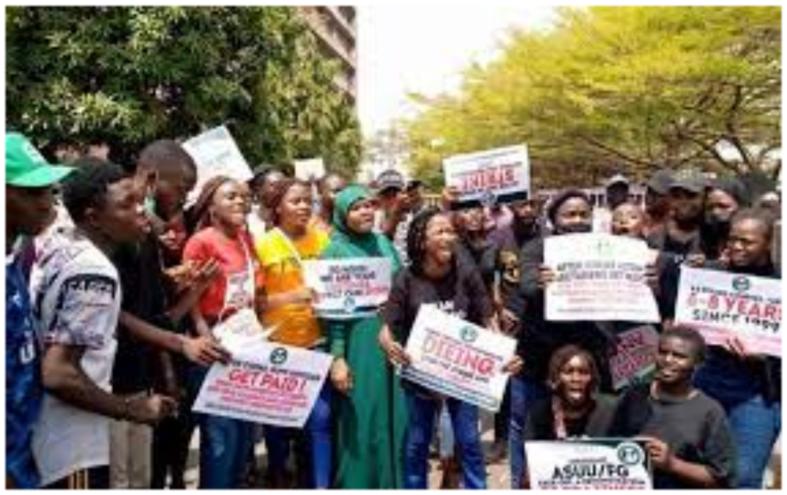By Sunday Dada
A 19-year-old girl and her family in Port Harcourt are in a dilemma over how to handle her recently discovered weeks-old pregnancy. The girl (whose identity is being protected) is a 200-level student at the University of Port Harcourt. She got pregnant for a young man in her area.
She has been home idle for months, following the closure of her University and the declaration of a strike by University lecturers nationwide, on February 27, 2022, under the Academic Staff Union of Universities, ASUU. Her family has reportedly made arrangements to send the girl to Ghana to continue her education.
ASUU had halted classes in demand for the enforcement of an agreement they entered into with the Federal Government for improved welfare for the members and teaching conditions in Universities across Nigeria.
This young girl is one of those the devil found work for in the months of idleness since the strike, while their education faces a bleak future.
Our correspondent confirmed that some other students in forced idleness, have taken to vices such as gambling and yahoo, yahoo a.k.a Advanced Fee Fraud.
Education lays the sublime foundation for any human development and determines the strength of 21st-century society in socio-economic advancement.
This is why governments in developed climes invest fortunes in the provision of basic, creative and affordable education for their people.

In pre-literate societies, our forbears devised a means of non-formal education which was creative enough to transform their societies. In doing this, they prepared informal and moral codes that provided the basis for learning and developed an acceptable system of governance for themselves. It also served their purposes well enough to survive the harsh conditions of realities of that time.
As societies evolved into the renaissance ages, the system of learning and the need for a formal system of education became sophisticated. This ultimately led to the development and formulation of deliberate policies that gave education a pride of place in the annals of human history.
Examples of such evolution were the Arab societies which in a bid to compete with the West in all human endeavours and ultimately be in self-sufficiency, promoted science education which included medicine and technology. They did this because they learnt that the quickest and safest way to break away from western colonization was to be scientifically independent.
To achieve their purpose, they invested massively in research, especially in the study of Mathematics and Physics and did not also neglect other aspects of human life such as Law and Philosophy. They built and funded thriving institutions which guaranteed their speedy break from western technological and infrastructural colonization. In the end, we saw a resultant effect in the rapid development of their societies.
Today, it can be rightly argued that most of the Persian Gulf societies like Iran, Qatar, Saudi Arabia and the United Arab Emirates etc, can compete favourably with the west in science and humanities.
Here in Nigeria, our fathers enjoyed similar attention from their forbears. Though they were hampered by limited resources, they, however, succeeded in the acquisition of basic quality education that set the stage for our socio-economic and political advancement even though the foundation was not enduring enough as its survival depended on the dictates of colonial tendencies.
However, in South-West Nigeria, the Yoruba led by the Premier of Western Nigeria, Chief Obafemi Awolowo, using their cocoa resources, set the stage for the rapid education of the region when he promoted free and compulsory education across the region.
He declared state and oversees scholarships in science and arts for teeming young people and encouraged them to go into research which also promoted the development of the ‘Odua’ language.
Soon after, the region began reaping the dividends when they emerged as leaders of the private sector and controlled the economy of Nigeria. They also produced the highest number of Professors in the country. This is in addition to the globalization of the Yoruba language.
Although other regional leaders soon followed the footsteps of ‘Awo,’ their efforts were however not enough to emancipate their regions from underdevelopment as we have seen in the northern region.
Despite the lofty efforts of our founding fathers, however, our system of education does not only lack the core indices of human development, but it also deviates from the structures of acceptable global standards which teach an average student to be productively creative and be in self-sustenance as against the current trend which teaches the student to carry files to roam the streets to look for un-available white-collar jobs. This has been so due to the lack of commitment by successive governments to recognize and adequately fund education as a tool for national development.
In 2004 the Federal Government of Nigeria reviewed the national education policy and adopted education as an instrument for national development. The new approach recognized the need for a functional educational system that can equip students with dynamic knowledge and skills for high-level manpower for national development and global competitiveness. However, despite the lofty aspirations of the policy, Nigeria is yet to fully maximise the potential of education as a tool for national development. The major impediment to the actualization of the policy has always been inadequate funding. This challenge has been manifest in the current state of education infrastructure and the quality of the output of teachers. The challenge can also be measured in the lack of quality graduates that have emerged from the system over the last three decades.
The lack of quality funding and other structural challenges within and outside the practice environment has led to decades-long protracted disruptions mostly in the tertiary sector. The disruptions have mostly come in the form of strikes by academic unions and periodic protests by students over fees increment, and a lack of basic amenities in their hostels, among others.

The objective of this report is to evaluate the impact of incessant academic disruptions at the tertiary level of education due to the lack of industrial harmony between relevant stakeholders in the sector, on students.
The Academic Staff Union of Universities (ASUU) commenced its ongoing strike on February 14, 2022, after the Federal Government failed to meet some age-long demands of the union. ASUU’s demands to the federal government are in three parts which include: a review of members’ condition of service, academic freedom for scholars, and university autonomy. A review of the demands however showed some core fundamental issues which include the non-release of revitalisation funds for public universities, renegotiation of the 2009 FGN/ASUU agreement the union signed with the government, and the release of earned allowances for university lecturers.
Another important aspect of the union’s demand is the agitation for the deployment of the University Transparency and Accountability Solution (UTAS) payment platform for the payment of the remuneration of academic staff. As expected the three-month-old strike which has paralyzed academic activities in public universities has come with many unintended outcomes for the students. This report is prepared with data obtained from field visits and in-depth (IDI) interviews conducted with stakeholders on the impact of the strike on students and the broader implications on the future of the country. Stakeholders, who bemoaned the continuous plight of the sector, stated that until Nigeria becomes intentional in the provision of quality education for her young population, the nation will continue to face a bleak future.
According to the Chairman of the Academic Staff Union of Universities, University of Port Harcourt Chapter, Dr Uzodinma Darlington Chima, ASUU is interested in the educational well-being of every member of the university community. He said, “ASUU remains the only Union that is interested in the welfare of its members and the state of universities in Nigeria.”
Dr Chima stated that ASUU’s effort for a better tertiary educational system was a fight toward nation-building that should enjoy the support of both students and parents. He lamented that while the enrolment rate of students into tertiary institutions keeps increasing, “there is a lack of serious commitment by the government at all levels to improve the carrying capacity of the universities. Dr U.D. Chima further gave a breakdown of the demands of ASUU as follows:
Chima informed that whilst the government at both state and federal levels continue to establish new universities, little or no attention is given to infrastructural development within the universities. He said due to the proliferation of universities which also impacts negatively on available funding, ASUU proposed an amendment to the National Universities Commission (NUC) Act, to prevent state governors from establishing new universities as a constituency project. He also informed that most universities lack basic teaching and learning aids which impacts negatively on teachers’ and students’ productivity.
The Chairman also challenged stakeholders to pay a visit to students’ hostels in government-owned universities which he likened to ‘correctional centres.’ He said in most of the hostels, students hardly have running water and adequate power supply that should aid their study, especially at night. He also stated that most public universities grapple with overcrowded classrooms and functional laboratories.
Dr Chima also stated that the few learning facilities built in universities through the Tertiary Education Trust Fund (TETFUND) were courtesy of ASUU’s struggle. He informed that despite their struggle towards the establishment of TETFUND which is funded through a 2% education tax, the federal government hijacked the intervention agency and removed ASUU’s representative from the Board of TETFUND. He said the removal of ASUU from the board was deliberate in order to promote corruption in the agency. While calling on the government to investigate the activities of TETFUND, Dr Chima also called for the unbundling of alleged bureaucracy within the agency.
Dr U.D. Chima informed that the national economic council approved the sum of 1.3 trillion nairas in the wake of the industrial action in 2021 to revive public universities. He however regretted that only 200 billion nairas were released to the universities through TETFUND with plans by the government to spread it over six years. The action he said does not represent a commitment on the part of the government to fund universities. The adverse effect he said was the continuous deterioration of learning facilities which translates to the production of half-backed graduates. He also stated that.
The chairman also lamented the disregard for the student ratio policy. He stated that while there are over two million students in the country, the country can only boast of a little over sixty thousand lecturers. This challenge he said is further complicated by the lack of adequate remuneration for lecturers who put in extra efforts to achieve their mandate.

Dr U.D. Chima informed ASSU’s primary grouse against IPPIS is majorly in two parts; first, he said IPPIS has a structural defect which does not take into cognizance the peculiarities of a university system such as issues bordering on sabbatical and visiting lecturers. He also the structural defects also affect both teaching and non-teaching staff who suffer from irregular salary payments. Dr Chima also stated that the second challenge ASUU has with the IPPIS payment system is its alleged use as a conduit for corruption within the office of the Accountant General. He informed that it was for these reasons the union recommended the use of the University Transparency and Accountability Solution (UTAS) which he said will respond to the peculiar challenges of the university system.
A total of 18 students were interviewed in addition to several informal discussions with some parents. The students were selected from the University of Port Harcourt, Federal University Otuoke and the University of Lagos. The students were also selected to reflect gender balance. The interviews and informal discussions which were conducted between June 2 – 5; 2022 were done through mobile phones and face-to-face conversations. Semi-structured verbal questions were asked to gather information related to the impact of the ASUU strike on them and their wards.
Findings arising from the reviews and conversations provided the basis for the achievement of the objectives of this report. The interviews and informal discussions with relevant stakeholders revealed some interesting findings which have been summarized into three thematic impacts. They are:
1. Health impacts
2. Economic impacts
3. Academic impacts
One of the major impacts of the ASUU strike on students is the dangerous toll the strike has taken on students. An assessment of the mental health of students who were interviewed indicates that most of them suffer from anger, anxiety, and depression disorder. Some of them also informed that they had contemplated committing suicide at the point of their lives during the strike. Two out of the students who contemplated suicide stated that they had thoughts after seeing their friends who got admission into private universities in the same year, graduate ahead of them. The third student who contemplated suicide informed me that she contemplated suicide after her admission into the University of Bradford which she got through a scholarship was nullified because she couldn’t provide her transcript within the deadline. According to her, all efforts made to get her proved abortive due to the ASUU strike.
All the students who live off-campus told our correspondent that they face harassment from their landlords to renew their rent despite not being around as a result of the strike. Some of them also stated that their landlords asked them to either renew the rents or pack their belongings out of their apartments. Some students however informed our correspondent that they took advantage of the strike to embark on new business ventures while others said they have acquired new skills. They however categorically stated that it will be very difficult for them to go back to school due to the monies they now make.
Almost all the students who spoke to our correspondent stated that they feel academic rusty and may be reluctant to resume studies. They also stated that they have lost interest in studying in Nigeria. They said they feel reluctant to continue their studies in Nigeria due to the unstable academic climate in the country.
While they admit that they owe themselves and their families a duty to complete their studies when the strike is called off, they however informed that they expect a huge difficulty in re-adapting to the rigours of academic exercise.
We spoke to a number of students from three tertiary institutions namely the University of Port Harcourt, Federal University of Otuoke, and the University of Lagos; all of them corroborated most of the issues raised by Dr U.D Chima on the challenges of infrastructural deficit. A visit to Ignatius Ajuru University, a state-owned University in Rivers State which is not observing the ASUU strike also corroborated the challenge of overcrowded classrooms. Specifically, lecture halls in the department of Political Science, Computer Science, and Engineering were all overcrowded. Some students who spoke to our correspondent informed us that the challenge of overcrowded classrooms will be far worse when students have resumed fully.
Students of the Department of Computer Science also complained about the lack of functional instructional libraries to aid their learning. They informed that the challenges of the absence of functional laboratories also cut across all programmes. A lecturer who spoke anonymously to our correspondent, said: “they keep telling us this is a new university anytime we complain about the lack of teaching aids. There are no facilities, as a lecturer, you come to a lecture hall and you’re overwhelmed due to the number of students in your class.”
At the University of Port Harcourt, some MSc students in the department of communication informed me that they were made to contribute funds twice for the purchase of air conditioners for their lecture hall. They added that the initial funds contributed for the same purpose were not utilized. When asked if the department gave any explanation why the initial air conditioner was not bought, the students informed that no explanation was given by anyone.
The country’s national development plan is in limbo as long as the nation continues to have a flip-flop educational system that suffers underfunding and low-quality graduates. The productive capacity of students is also put into serious jeopardy as a result of incessant disruptions to their study plans. While this may lead to an increased crime rate, Nigeria may yet also become the world capital of school drop outs. The implication of this is better imagined in terms of the present insecurity challenges and economic woes that have become a signature of our national life. While the school drop-outs may eventually take to crime, there is also a danger of a further increase in capital flights within the education sector, especially as parents search for alternative means to educate their wards outside the shores of Nigeria.
Therefore, if schools are going to provide the structural basis for a high-quality knowledge-driven economy, adequate funding and other needs as expressed ASUU must be given priority consideration by governments at all levels.
Source: National Point




